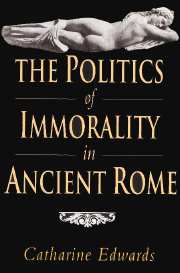Book contents
- Frontmatter
- Contents
- Preface
- Introduction
- 1 A moral revolution? The law against adultery
- 2 Mollitia: reading the body
- 3 Playing Romans: representations of actors and the theatre
- 4 Structures of immorality: rhetoric, building and social hierarchy
- 5 Prodigal Pleasures
- Bibliography
- Index locorum
- Index of subjects and proper names
Introduction
Published online by Cambridge University Press: 23 September 2009
- Frontmatter
- Contents
- Preface
- Introduction
- 1 A moral revolution? The law against adultery
- 2 Mollitia: reading the body
- 3 Playing Romans: representations of actors and the theatre
- 4 Structures of immorality: rhetoric, building and social hierarchy
- 5 Prodigal Pleasures
- Bibliography
- Index locorum
- Index of subjects and proper names
Summary
In an attack on luxury, Seneca praises the frugality of the elder Cato:
M. Cato Censorius, quem tam e republica fuit nasci quam Scipionem, alter enim cum hostibus nostris bellum, alter cum moribus gessit …
Marcus Cato the Censor, whose life was of as much benefit to the state as that of Scipio, for while Scipio waged war on our enemies, Cato waged war on our morals …
(Sen. Ep. 87.9)Romans laid claim to a particular preeminence in the spheres of both fighting and morality. Seneca presents the activities of the guardian of morals as parallel to those of the general; each has made a vital contribution to the res publica. As a Stoic, Seneca was committed to the notion that the ties which bind all human beings to one another transcend those which bind the individual to any particular state, and yet for Romans there was only one res publica, Rome itself. By using the traditional vocabulary of Roman moralists, by taking as examples the figures of Scipio and Cato, Seneca situated his text in a long line of Roman moralising. Seneca wrote his moral and philosophical works over two hundred years after the time of the elder Cato, who lived in the second century bce; Cato's writings in turn referred back to the virtues of still earlier Romans, maiores nostri (‘our ancestors’). The highpoint of Roman moral virtue was always already situated in an idealised past.
- Type
- Chapter
- Information
- The Politics of Immorality in Ancient Rome , pp. 1 - 33Publisher: Cambridge University PressPrint publication year: 1993
- 1
- Cited by

